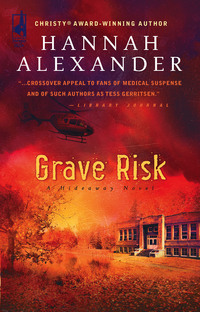
Полная версия
Hideaway Home

Hannah Alexander
Hideaway Home

MILLS & BOON
Before you start reading, why not sign up?
Thank you for downloading this Mills & Boon book. If you want to hear about exclusive discounts, special offers and competitions, sign up to our email newsletter today!
SIGN ME UP!
Or simply visit
signup.millsandboon.co.uk
Mills & Boon emails are completely free to receive and you can unsubscribe at any time via the link in any email we send you.
We wish to honor our loved ones who risked
everything for our country’s freedom
in World War II: Ralph Hodde, Larry Baugher,
Irwin Baugher, Loy Baugher, Cecil James,
Leonard Wesson and Glen Jones.
Contents
Acknowledgments
Chapter One
Chapter Two
Chapter Three
Chapter Four
Chapter Five
Chapter Six
Chapter Seven
Chapter Eight
Chapter Nine
Chapter Ten
Chapter Eleven
Chapter Twelve
Chapter Thirteen
Chapter Fourteen
Chapter Fifteen
Chapter Sixteen
Chapter Seventeen
Chapter Eighteen
Chapter Nineteen
Chapter Twenty
Chapter Twenty-One
Chapter Twenty-Two
Chapter Twenty-Three
Chapter Twenty-Four
Chapter Twenty-Five
Chapter Twenty-Six
Chapter Twenty-Seven
Chapter Twenty-Eight
Chapter Twenty-Nine
Chapter Thirty
Chapter Thirty-One
Chapter Thirty-Two
Chapter Thirty-Three
Chapter Thirty-Four
Chapter Thirty-Five
Epilogue
Acknowledgments
We’re so grateful for our editor, Joan Marlow Golan, her exceptional staff and for our agent, Karen Solem, who help us make our books the best they can be.
We thank Lorene Cook, who helped us establish the authenticity of our story and patiently answered late-night calls with questions about “the way it was back then.”
Ray Brown, Barbara Warren, Lee McCormick, Soni Copeland, Mike Hemphill and Jackie Bolton shared their memories, their knowledge, their expertise and their historical material for this story. We will always be grateful for their generosity.
Chapter One
Something was wrong. The news hadn’t reached California yet, but Bertie Moennig knew something had happened. She couldn’t pinpoint when she’d decided she wasn’t jumping to conclusions, but her instincts had never failed her. She would have to wait and see.
It frustrated her no end, because she didn’t like to wait for anything. Still…in the midst of this wretched war, she’d grown accustomed to it.
Bertie paused in the noisy workroom of Hughes Aircraft to untie the blue bandana from her head. Her hairnet had ripped this morning, too late for her to get a replacement, and there were strict regulations about keeping long hair restrained.
Now, half of her bun had fallen down over her neck and shoulders. As if this plant wasn’t already hot enough! Folks liked to chatter on and on about the wonderful weather in Southern California; those folks must’ve never worked in a busy, noisy aircraft plant on a sunny day.
Another trickle of perspiration dripped along the side of Bertie’s face, and she rubbed her cheek against her shoulder while fiddling with the bandana. She’d take a summer afternoon on the farm in the Missouri Ozarks over working in the heat of this plant any day.
Not that she disliked California. She loved it most of the time—the weather, the ocean, the mountains—but it could be a challenge for a country girl to get used to the crush of people and traffic, even after living here for eight months.
In Hideaway, Missouri, Bertie would’ve ridden her bicycle the three miles to work, but here she saw more cars passing by the apartment than she would see in a year back home. The crazy pace of Southern California had shocked her upon arrival and—
“Hey, hillbilly!”
She winced at the sound of the barrel voice approaching from behind her. Looking around, then up at the department supervisor, Franklin Parrish, she braced herself for yet another earful of complaining.
“Yessir?”
“Get back to work. And get that hair up,” he snapped, looming too close, as he always did. He eyed the blond hair that fell around her shoulders, then his gaze wandered.
Even though he mocked her Ozark accent and figures of speech, he made no secret of the fact he liked her figure well enough.
She tied her hair back on top of her head. “A man in your position should mind his manners, Mr. Parrish,” she said quietly, wishing Edith Frost, her roommate, was here. She’d have an extra hairnet.
Franklin leaned closer to Bertie, his face flushed like that of a child who’d been caught snooping in his mother’s purse. “And you’d better mind who you’re talking to, hillbilly. I can turn you out of here by signing the bottom line of a little sheet of paper.”
Bertie met his gaze, trying hard not to show her irritation. After three hundred hours of instruction in St. Louis, she’d been sent here as a trained machinist at the company’s expense. If he fired her for no good reason, he’d have to answer for his actions.
“You want these parts to pass inspection, don’t you?” she asked. “We still have a war to win against the Japanese, and I aim to help win it.” She knew she should smile to take the bite out of her words, but she held his gaze, straight-faced.
Franklin glowered. Bertie nipped on her tongue to keep it from getting her into deeper trouble. Franklin grunted and walked away.
Bertie sighed. Someday, she’d go too far, but she didn’t think that day had come yet. Years ago, her mother had tried to tell her that a woman could get more accomplished with honey than with vinegar, but Bertie had found that the two mixed well together. That was especially true for a woman working in a man’s world.
Besides, Mom never had depended strictly on honey to get what she wanted. When she was alive, Dad used to brag to the other farmers down at the coffee shop that his wife was full of more sass and vinegar than any plow mule in the county. Just recently, he’d accused Bertie of taking after her mother a little too much.
Those words had made Bertie proud, and it had given her courage to know that she had some of the same strength of character as Marty Moennig.
She felt a pang of homesickness. She missed her father and couldn’t stop worrying about him. She’d tried to place this dread in God’s hands several times last night and this morning, but her mind kept grabbing it back again. Where was he?
She also missed Red Meyer like crazy, and thinking about him raised her anxiety even more. Though Red was somewhere in Italy, cleaning up after the surrender of the Germans last month, she knew she would feel closer to him if he was back home in Hideaway.
Of course, if Red was back in Hideaway, she’d be there, too. So many memories…so much she missed. She wanted to be able to step out of the house and stroll around the victory garden in the backyard. Had Dad even been able to plant one this year? He was all alone on the farm, with so much work to keep him busy.
Fact was, she worried about both the men in her life. News of Red hadn’t come often enough to suit her lately. He’d stopped writing to her. Just like that, the letters had quit coming. She was pretty sure the Army hadn’t suddenly stopped sending soldiers’ mail home.
Charles Frederick Meyer didn’t like being called anything but Red. With a head of brick-colored hair and a blue gaze that looked straight into the soul, he was strong and kind, and quick with a smile or a joke.
Bertie could usually spend much of her workday thinking about him, dreaming of the time they would be back together again. That was easier to do now that the war with Germany was over.
But if he was out of danger, why wasn’t he writing?
Red Meyer stared out the train window at the lush Missouri Ozark landscape, nearly lulled to sleep by the gentle rocking of the passenger railcar. The train took a curve, and he got a better look at the cars ahead of him. Four cars forward, one lone figure with the straight, stiff posture of the military, made his way to the rear exit.
Looked like at least one other person on this train was as restless as Red, but he didn’t have the luxury of pacing along the aisles from railcar to railcar.
Instead, he tugged one of the envelopes from his left front pocket and pulled two folded pages from the raggedly slit top. Gently, he unfolded the sheets and looked at the handwriting.
He didn’t read the words right off. He didn’t need to. He practically had this letter memorized—maybe not every single fancy swirl and dotted i, but he could see an image in his mind of Bertie Moennig leaning over her stationery, chewing on the end of her pencil, eyes narrowed. It had been her first letter to him, and it was well nigh three years old. The smudges and worn corners of the pages showed how often he’d handled them.
Dear Red,
I’m sitting here at the station in Hollister, watching your train pull away, trying hard not to get the paper wet with my tears. If you ever show this letter to anybody, I’ll make you pay when you get back home.
He’d laughed at that when he first read it, but he’d not been able to see the page very well for a few lines, himself.
I already miss you so much I want to run after the caboose and hop on, the way we did ten years ago. Remember how much trouble we got into when the train didn’t stop until it reached Springfield?
Red nodded to himself. He remembered. Gerald Potts had had to drive up to get them, and then all the way home he’d lectured them about the stupidity of risking their lives for a lark. Neither of them had ever told Gerald that his own son, Ivan, was the one who’d dared them to hop that train in the first place.
We’ve been friends for so long, Red, I can’t imagine going on without you. You can make me feel better no matter how bad things are, even with Mom’s funeral only weeks past. I don’t know how I’d have gotten through it without you.
He squeezed the pages between his fingers and stared out at the passing countryside. He couldn’t remember a time when Bertie wasn’t in his life, whether she was socking him in the mouth for picking on her in their Sunday school class, or kissing him goodbye twelve years later at the train station, chin wobbling, eyes promising more than he’d ever dared ask of her. A future.
He looked back down at the letter, swallowing hard as he recalled her face, her voice, the love he’d held on to for so many long, hellacious months.
Red, you remember that talk we had on our first real date? You should, since it’s only been a couple of months. You told me you’d always thought you’d end up a bachelor, because you never thought you had anything special to offer a woman in marriage. But you are somebody special, and don’t let anybody ever tell you different.
His eyes squeezed shut. He’d never loved her more than he did right now. She’d been so true to him all this time. Her letters…they’d been his lifeline. Her love was what kept him going and kept his determination strong to do the right thing by her, though it was the hardest thing he’d ever have to do.
I’ve heard they treat soldiers rough in the Army, but you’re strong enough to take whatever they throw at you. Don’t you forget you’re more of a man than most men ever even dream of being. You’ve got more heart in you than anybody I’ve ever known, and you’d make a fine husband. The woman who marries you will never be sorry. Just make sure you get home alive to get married.
I’ll be waiting here for you, and I’ll be writing so much you’ll probably get tired of reading my letters. If anything happens to you, it’ll be happening to me, too, so you’d better take care. You have both our lives in your hands.
If he’d smiled at all during these past three years, it had only been because of her. Oh, sure, he’d let himself joke with the guys, or at least chuckle at their jokes, but it was because thoughts of home kept him going—thoughts of Bertie.
He didn’t pay any attention to the man in Marine uniform coming down the aisle, until that man plunked himself down in the empty seat next to Red.
“On your way home, soldier?” came an awfully familiar voice.
Red’s head jerked up. He looked with surprise into the face of his good friend Ivan Potts, in the flesh.
Before Red could say anything, Ivan had him in a bear hug and was thumping him on the back so hard it felt like Red’s spine might snap in two. The man had the muscles of a plow horse.
“I didn’t know you were on this train ’til I caught sight of your face in the window when we went around that last curve.” Ivan’s grin showed the contrast of his white teeth against dark-tanned skin. “Thought it was you, anyway.” He rubbed his knuckles over Red’s scalp. “Can’t miss this color, Charles Frederick.”
“Well, if this don’t beat all.” Red tucked the letter back into his pocket, trying not to let it catch Ivan’s attention. He shoved the cane out of sight beneath his seat with his foot. Happy as he was to see one of his closest friends alive and whole, he wasn’t ready to do any explaining. Not yet.
Chapter Two
Red grinned at his old buddy—the first time his face had felt a smile in days. He almost expected to feel his lips crack, but they held firm. It was good to see Ivan all decked out in his uniform, with medals aplenty, some as golden as the hair on his head.
“Man, oh, man, I’ve missed you,” Red said.
“Same here. Heard you won the war on your side of the world,” Ivan said, clapping Red on the shoulder. “Now come and help us with ours. The Pacific’s still hot.”
Red felt his smile slip. “You’re not home for good?”
“How I wish!”
Red’s stomach clenched with fresh worry. He’d been relieved when he first saw Ivan, alive and well. “You’re home on leave, then?” That wasn’t what he wanted to hear.
Ivan nodded. Something seemed to darken in the deep brown of his eyes. “One week, then I’m back in the trenches.”
“Maybe we’ll have won the Pacific by then.”
The grin returned. “Isn’t going to happen without my help. I want to make sure the blue star my folks have in the window at home doesn’t get exchanged for a gold one.”
“I think you’re too ornery to die,” Red said. “But you’d best take care, anyways.” It might destroy Gerald and Arielle Potts if anything happened to their only child. They’d always doted on him.
Ivan had been the most rambunctious of Red’s friends throughout their school years, leading the gang when it came to childish pranks, overnight hunting parties and outhouse tipping. He’d given his poor parents a lot of grief. Red recalled one night when Ivan had sneaked a cow from the barn of a local farmer into a high-school classroom. It wasn’t discovered until the morning—along with a big mess.
“I’ve made it this far.” Ivan’s voice snapped Red from his memories. “I plan to make it through this war alive.”
Once more, Red eyed the decorations on his friend’s chest. Ivan Potts had a right to be proud of the medals he’d earned. He’d proven himself to be a man in this war, and his parents would be more than proud.
Red’s medals were packed away in the duffle under his feet. He wore his regular uniform instead of military dress, and he had kept his head down most times on the trip home, hoping nobody’d notice him and start asking questions. The last thing he wanted to do was talk about the war. Or talk about anything, for that matter.
War sure changed people.
All his life, Red had started conversations easily with strangers, never running out of something to talk about. But that had been a different Charles Frederick Meyer.
Ivan glanced out the window. “We’re getting close.”
Red nodded, rubbing sweat from his forehead as the sunlight beat down through the window. “It’s nice to be nearing home, sure enough.” The hills got a little taller, the valleys deeper in the southwest part of Missouri.
“I can’t wait to be back for good,” Ivan said. “How about you, Red? Are you coming home to stay, or do they have plans for you over on our side of the world? To hear Bertie tell it, the Army can’t do without you.”
Red warmed at that but he didn’t know what to say now. “War’s over for me, probably.” He couldn’t bring himself to explain why.
It’d be easy for a man in his shape to think he wasn’t worth much of anything anymore, since he probably wouldn’t even be able to do the work that needed doing at home now, much less help tidy things up after the ruin of a whole continent. He’d wanted to be there still, liberating the prisoners and helping set things in order again.
He squeezed his eyes shut against the June morning sun, but he opened them again quickly, and caught Ivan watching him.
“I don’t think the war will ever be over for us,” Ivan said, his voice suddenly soft. “It follows a guy wherever he goes.”
Red nodded. The nightmares…
“Thanks to Bertie and her friends, I’ve kept up with your whereabouts most of the year,” Ivan said. “How’s Italy?”
“Hardly anything there anymore,” Red said. “Except the mud and rubble of wrecked buildings. Always the mud. Heard you took Iwo Jima.”
Pain crossed Ivan’s features, and Red knew he’d said the wrong thing. Would life ever get back to the way it had been, when everyone didn’t have to tiptoe around minefields of conversation?
“You don’t have to answer that,” Red told him.
Ivan nodded slowly. He swallowed and met Red’s gaze with a fierce stare. Then he looked down and swallowed again.
“We were landing on the beach,” he said, his voice so soft Red had to strain to hear. “Next thing I knew, the night sky seemed to explode all around us.”
Red winced. He knew what that meant.
“Five of my best buddies were killed before I could move.” The words seemed to spring from Ivan—fast, hard, his voice low—as if he’d been bottling them up inside.
Red studied his friend, but didn’t see any signs of damage, no Purple Heart. “But they didn’t get you.”
Ivan shook his head. “Sometimes I think it would’ve been better if I’d gotten a bullet, too.”
“No, it wouldn’t.” But Red understood.
Ivan glanced at Red, eyes narrowing. “What’s your worst memory?”
Red couldn’t tell him. He could probably never tell anybody. So he pulled out another recollection. “German soldiers surrounding our fire support team.”
The surprise didn’t show in Ivan’s eyes as much as it did in the sudden jutting of his strong chin—as if bracing himself for details. “You were captured.”
“It’s been a couple of months.” Even now, Red could picture in his mind the grim, white faces of his captors. He could feel the fear licking at his insides, almost feel the rough hands shoving him and Conner and Beall through fields of mud.
“When?” Ivan asked. “Why didn’t I hear about it? Bertie would have told me about it in a letter.” He looked at Red’s uniform for the first time. “Where are your medals?”
Red shrugged. “It don’t matter. I’m alive. Before word could be carried back home that we were prisoners of war, we escaped in the middle of the night.”
Ivan gave a low whistle. “If that doesn’t beat all.”
“Just in time, too. I got the impression, picking up on some of their words, that they’d planned to kill us soon.”
“You speak German?”
Red nodded. “I learned some words from my pa years ago. I hadn’t even realized I remembered them until I listened to our captors talking to one another. There were five of them and only three of us. I thought we were goners.”
“How’d you get away?”
Red shrugged. He couldn’t talk about the whole thing. “The fifth night, after a long day’s march, we got loose from our bonds.” He couldn’t go into more detail without explaining more than he wanted to.
Ivan waited, eyes slightly narrowed in confusion. “Just like that?”
Red nodded. He’d never thought much about the humanity of the enemy. That wasn’t something they talked about in the foxholes or on the scoutin’ trail. All they did in the foxholes was curse the enemy, and do everything they could to make sure he died.
The rattle-clack-rattle-clack of the train filled the silence for a few long moments as the two men sat steeping in the ugliness they’d seen.
“Don’t mention that bit about the massacre to my parents,” Ivan said softly. “Why worry them about something that’s already happened? They’ve worried enough about me in the past three years.”
“Reckon there’s lots our families are never gonna know about.”
“Sometimes it seems the farther I get from the war, the more I remember,” Ivan said.
Red knew what he meant. All that loud commotion clattered around in his mind, along with pictures of mangled or dead friends. He still felt the pain of his own wounds—both in his flesh and in his heart.
“Maybe we have to remember,” Ivan said. “A man’s got to stay on the alert.”
Red agreed, but he couldn’t help wondering if he was already going soft. Since he was a German by blood, he couldn’t hate his former countrymen.
It was hard not to hate them when he heard about all those concentration camps, the awful things they did to other human beings. Torture? Gas chambers? Trying to stamp out a whole race of people? Genocide, it was called. Devilish. Straight out of the pits of hell.
As the thoughts started tormenting him once again, Red did what he always did to take his mind from them. He patted his shirt pocket, thick with letters.
Ivan, of course, knew without asking what was in Red’s pocket. “You still writing to Bertie?”
Red grimaced. “She’s been doin’ most of the writing.” Especially the past few weeks.
His sweet Bertie had a heart as tender and beautiful as spring violets, a face to keep a man alive through the worst of war, and a voice as warm and spicy as hot apple cider.
But he couldn’t keep thinking like that…not about her bein’ his.
“That little gal had a regular letter campaign going, you know,” Ivan told him. “She had all her friends writing to me, and any time I’d mention a buddy who hadn’t received mail in a while, sure enough, in a week or so he’d get a note from some stranger out of Culver City, California. Our Bertie’s all spunk. If she was president, this whole war would already be won.”
Red felt a quick rush of pride. “She’s kept me going, that’s for sure.”
“How’s Miss Lilly been getting on without you?”
“You know Ma,” Red said. “She says she’s doin’ fine, but it’s hard to tell ’cause she never complains.”
Ivan chuckled. “Strong as a Missouri mule and the best cook in Hideaway.”
Red returned his attention to the scenery sliding past the window. Now that Ivan had brought up the subject, Red remembered that he had someone else to fret about.
Until he was called up, he’d helped his mother run the Meyer Guesthouse in Hideaway. It had been a family operation since his pa’s death.
Lilly Meyer never let on about how hard it was to keep the place going without Red’s help—but he knew business must’ve gone slack without him to serve as fishing guide, hunting guide and storyteller, along with all the other chores he’d done for her every day.
Fishing along the James River had been a popular sport among their best and wealthiest customers, many of whom returned to Lilly’s guesthouse year after year for the fishing. These guests had gotten the Meyers through the depression.









